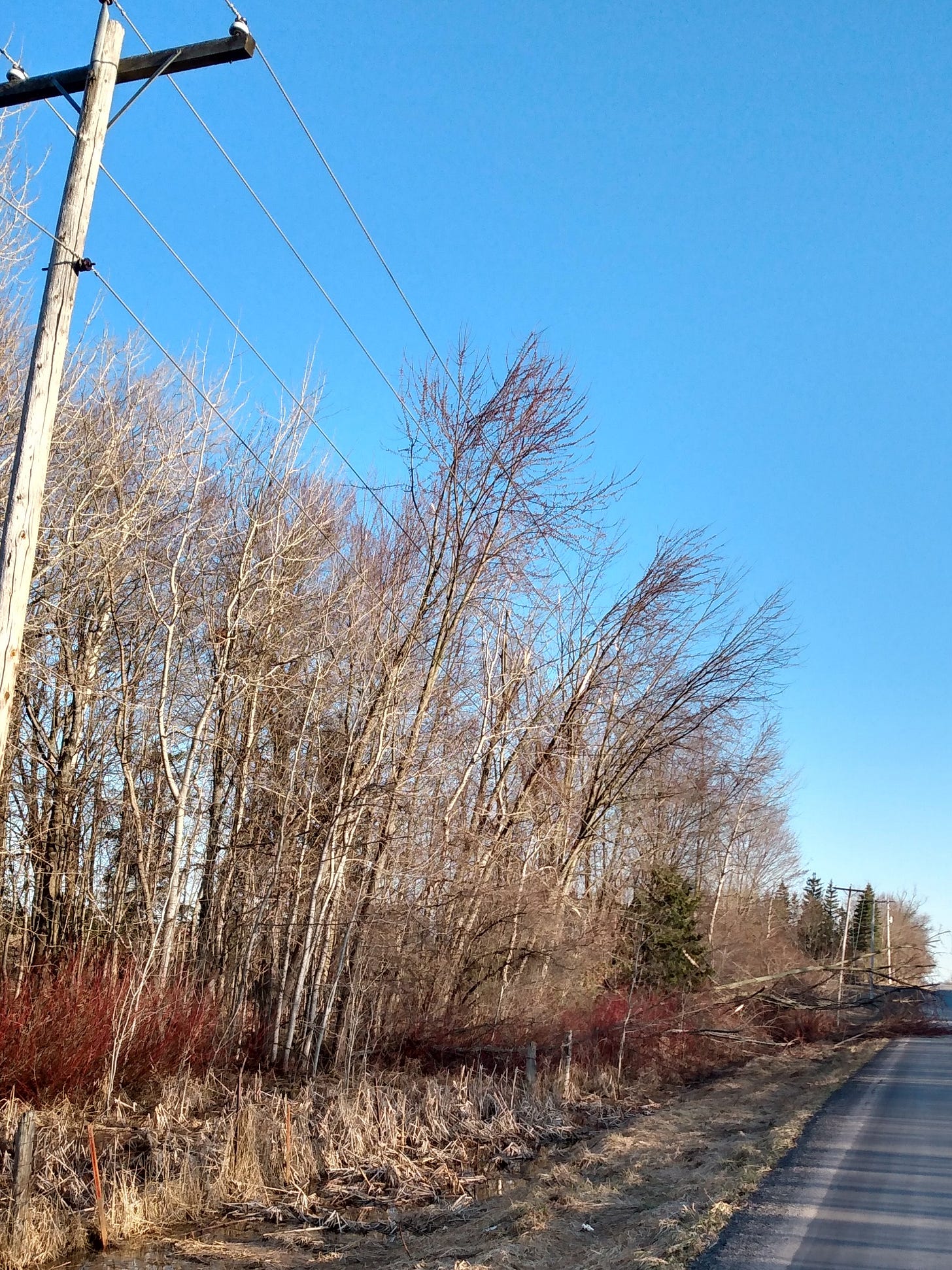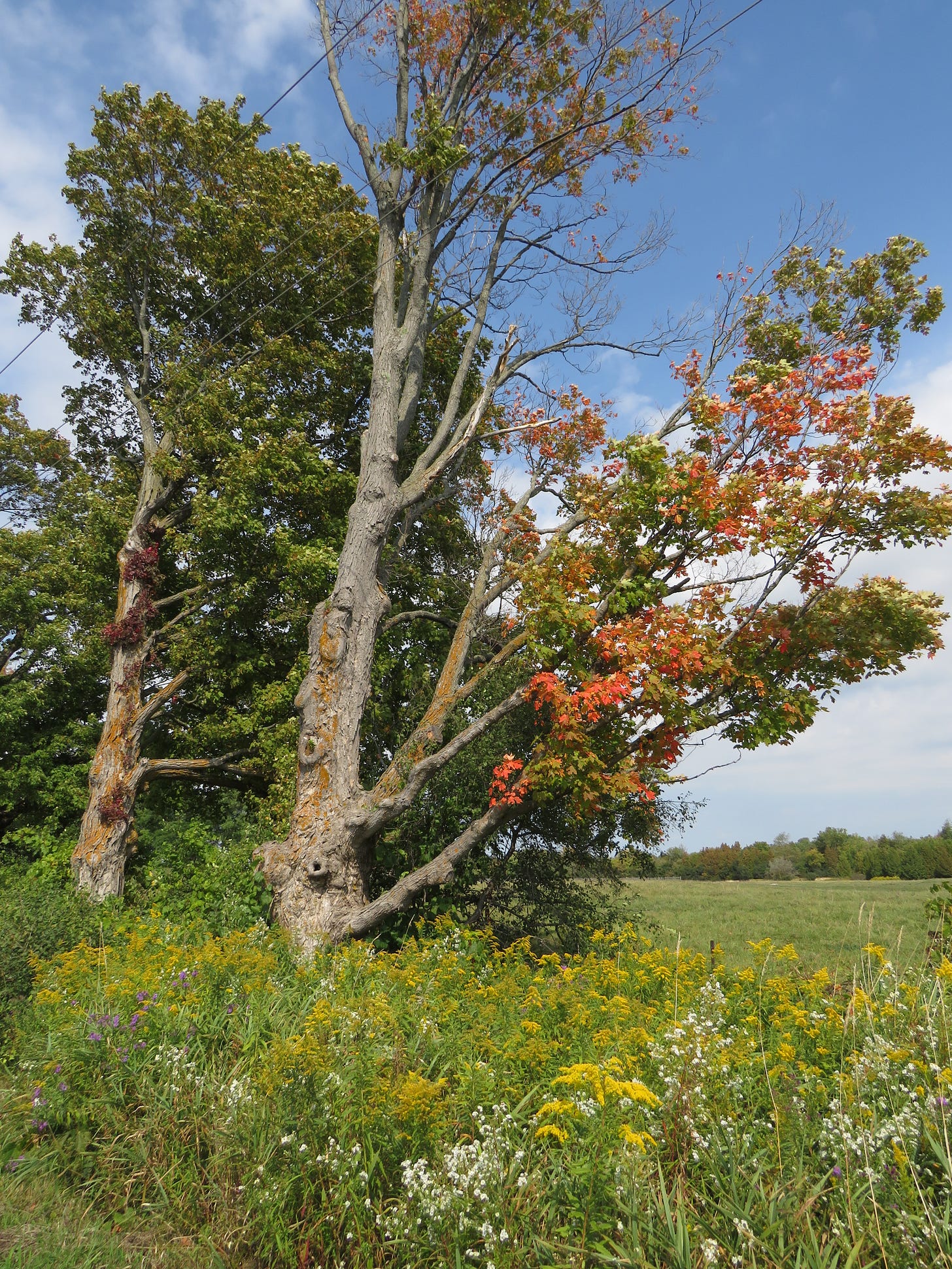He hurls down his crystals of ice like crumbs; who can stand before his cold?
He sends out his word, and melts them; he makes his wind blow and the waters flow - 147th Psalm [ESV]
The meteorologists warned us it was coming. But ice storms are chancy things. An ice storm warning could mean anything or nothing at all. Back in the Great Ice Storm of Jan. ’98, our hydro wasn’t affected more than a few hours, while others elsewhere were powerless for weeks. During a second, early spring, ice storm in ’98, when the hydro 1went out for a short while, my adolescent self, a couple of siblings, and a stray cousin occupied ourselves by going for a walk… in the forest. I did return with a splinter from a tree embedded in my scalp, but it hadn’t fallen on me, I had run into a branch. The household made some preparations this time, but were cautiously optimistic that any powerlessness would be short lived:
Day 1
Technically, the ice rain started the prior evening, but there was still hydro when the household arose and ate breakfast. The ice on the trees wasn’t thick enough to cause problems, yet. But it was perilous to step out of doors. A slick surface covered the steps and walkway.
By noon, the hydro flickered out, to no one’s surprise. Water had already been prepared for toilet flushing, handwashing, and drinking. Outside, the fine cold rain continued to congeal into ice on every surface it touched.
After several hours, the hydro returned. It then began a cycle of flickering on and off, just long enough for us to resume or start a task requiring electricity, only to lose power partway through. Supper finished cooking on the woodstove that supplements household heating in winter. After a candlelit meal, we gathered in the common room while one member read aloud. The hydro flickered on once more, then off again, and never returned.
As I tried to sleep, I heard loud cracks and crashes outside. It was too dark to see the silhouettes of the trees outside my window. In the early morning hours, I was wakeful, tending the woodstove.
Day 2
The grey daylight showed a glittering, brittle world. Every plant, great and small, was encased in ice over a centimeter thick. The lower branches of the maple outside my bedroom window, branches which normally arch over the tallest person’s head, bent to touch the earth. Branches so weighed down may suddenly give way, or, if the root system is weak, the tree itself may uproot and topple over. Every tree will respond differently and each tree species has its own strengths and weaknesses under the pressure of ice.
Opening a window or going outside the door unmuted a cacophony of cracking, snapping trees, from deep in the forest, across farmers’ fields, in the neighbours yards, and on our own lawn. A large branch of the birch tree in the front yard gave way, and the tall elm in the backyard lost its left arch. The willow tree shed branches like a distressed starfish, but like a starfish, it will regrow them. The stands of pines supported each other, shearing off branches on exposed sides, like a threatened lizard breaking off its tail, but, like the lizard, healthy pines can resprout new branches to replace the old ones. The spruce simply huddled their ice coated branches closer, and the cedar hedges were unmoved.

One of us set birdseed out on a tray. With even the smallest blade of grass coated in ice, finding food would be difficult for the small birds. Normally, squirrels of all colours vie with the birds for food, but only a feisty red squirrel appeared. I saw a grey squirrel attempting to climb on the underside of the large tree branches - the upper sides were too slippery. Most of the squirrels must have been trapped in their treetop homes.
A household member ventured out in a vehicle to find essential supplies and brought back phone pics and video of familiar roads unrecognizable with fallen trees. The vehicle itself had been struck by a falling tree with a glancing blow. Despite the danger, the neighbourhood turned out to assist each other, clearing fallen trees on the road, lending generators to those whose basements were flooding. By the afternoon the landline was dead. Cell phones were without data and phone service was spotty. Only battery radios brought in the outer world.
Concern was felt about the food in fridge and freezer. The old generator was dusted off, but proved recalcitrant. The fridge door was opened as little as possible, the freezers not at all. Neighbours brought shipping blankets to wrap the freezers in an effort to keep in the cold.
The rain warmed by single degrees. It was enough. By afternoon, the glittering ice turned opaque as it softened. From the window, I watched water run underneath the ice along branches, dripping out at the tips. By the evening, the casings of ice started to break apart and fall to earth in little showers. After a cold supper, I read aloud in the common room until the sun had set. Then, having nothing else to do, we retired. When I woke in the night to tend the fire I saw the silhouette of the maple outside my window. It stood unbowed and unburdened. The ice was thawed. The maples had not broken.
Day 3
The day rose gray, matching the household mood. We needed more drinking water, so I announced my intention of going on a water run and, at the same time, finding an area with cell data in order to check the hydro outage status.
As I drove, I noted the places where trees impeded wires. They were fewer than expected. On my return, I followed the track of the high velocity lines running to the local substation. The likely culprit for the substation outage was a hydro pole in the post office village, snapped by the collapse of half an ancient tree. I circled the farming neighbourhood to see what other old friends were lost. A line of maples in their seventh age stood nearly unscathed; while, from a tree stand beside the road, a toppled, middle-aged tree had drawn the hydro lines into a V between two unscathed poles.
Other household members had foraged for food. We gathered in the evening more cheerful, no longer besieged by ice. Life sans electricity had developed its own routine. After dark, we saw the horizon glow of the nearest town had returned and the lights on the high ridge across the lake were again visible. Restoration was getting closer.
During the night, I tended the fire, as the winds were gusting high and the temperature was dropping. While I watched the fire, I read, using the light on my e-ink reader. I finished Thomas Hardy’s Far from the Madding Crowd. Hardy’s description of rural life is vivid and the character of Gabriel Oak reminded me of one my ancestors. My working class, English-born great grandmother wrote that her father was “a shepherd and knew all about sheep: their habits and what they liked, their diseases and how to help them to keep healthy”, adding, “wherever he worked, he was respected” and was called “the Old Shepherd”.2
Day 4
Sun poured through the windows when I woke. The sky was deep blue, utterly cloudless, but the air outside was bitter with cold. Inside was comfortably warm.
Cell phone service had returned to normal levels. Calling the hydro outage number confirmed we were unlikely to have hydro restored for at least 36 hours, tomorrow night. The last excursion had been unsuccessful in finding a generator, as demand was high and stores were sold out. A search party set out in a different direction.
They found one. As soon as the freezers were running again, we set to work assessing the damage. It was much less than expected. Even the fully thawed items still had ice clinging to them. For supper, we had stew made hearty with the thawed vegetables and meat. We turned off the generator overnight. Another day was done. Would tomorrow bring full restoration? An ominous forecast predicted snow for tomorrow, turning to freezing rain, and then rain.
Day 5
Daybreak showed gray skies and the temperature was biting. We doubted if the lines would be fixed, given the weather. When I called the outage information line, it said power restoration in our area had been unforeseeably delayed. Another household member heard that power wouldn’t be restored for another two days.
We did not mind. The new generator was keeping fridge, freezer, and water pump running, and would charge and run small appliances at the same time. Only the stove, water heater, furnace, and of course, lights, could not be attached. But the woodstove was keeping the house warm and acting as a stovetop, so we could cook and heat water. In the afternoon, the phone rang. Communications were now fully restored.
By noon, snow began to be driven downward in a high wind. It changed to ice pellets, which covered the ground to a couple of centimetres. As the temperature rose toward the end of the day, the ice pellets turned to freezing rain, but before it accumulated to any amount, it turned to rain.
I had caught a cold and felt rather feverish, so I went to sleep early. I woke up after one o’clock, thinking I had heard something. I looked out the window to check the trees. They looked normal, silhouetted against the light. The light! The neighbour’s outside light was on. Still confused, I tried turning on my lamp. It worked. The hydro was restored.
In the morning, a thick fog rose as the ice pellets melted, and then the sun shone.
Hydro is a Canadian term for the electric power supply, due to the prevalence of hydroelectric dams providing said supply.
From my great-grandmother’s handwritten, unfinished memoir.








Quite an adventure! Sorry to hear some of the old trees were damaged or lost. 😕 Guess I can call now. 😉